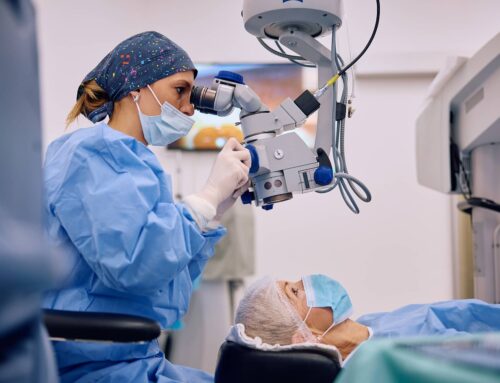Cataract surgery complications are minimal. While 98% of patients will come away from their cataract surgery with zero complications, it is important to understand what the problems are and what type of side effects are normal for this kind of surgery.
What are the Side Effects of Cataract Surgery?
It is completely natural to experience some side effects after cataract surgery. The most common ones are:
Blurry or Unclear Vision
Most patients will have blurry vision for at least a few days after surgery. This is normal as some of the typical swelling and inflammation that occur after any surgery resolves. However, if your vision remains blurry and doesn’t improve as the days go on, then it’s time to contact your doctor.
Dry or Itchy Eyes
There’s a small scratch on the surface of the eye after every cataract surgery, which may cause irritation afterward. For most patients, artificial tears are all that’s needed to improve the symptoms. However, be sure to make sure any drop you decide to take after your surgery (even over-the-counter) drops are approved by your doctor. This irritation typically gets better after only a few days. If your eyes are sore or ache, contact your surgeon
Red or Bloodshot Eyes
Your eyes may appear red or bloodshot. Most commonly this is from irritation of the fragile blood vessels on the surface of the eye. This is common and not a cause for alarm. However, redness in the setting of severe aching pain would be a reason to call your doctor, to make sure the pressure in the eye is normal, and to make sure there’s no infection.
Soreness or Discomfort
Severe aching or soreness may be a sign of elevated eye pressure or infection, especially in the context of worsening vision. If symptoms are worsening after surgery, instead of improving, contact your doctor to make sure one of these more serious complications isn’t occurring. Often the pressure can be mildly elevated after surgery and is not a serious concern. However, an infection can result in serious vision loss and is an emergency. Fortunately, with modern techniques infections are very rare after modern cataract surgery.
Light Sensitivity
You may find that light causes you discomfort or causes you to flinch away from it. You may see a visual “halo” effect around lights as well.
What Causes Blurred Vision After Cataract Surgery?
Having blurred vision after cataract surgery is not uncommon, but is a side effect that should clear up within the first few days or weeks post-surgery. If the blurred vision remains for longer than a few weeks, you could be experiencing any of the following complications.
1. Posterior Capsular Opacification (PCO)
This is when a layer of scar tissue forms behind the implanted lens. It results in blurred vision that is similar to what you would experience with cataracts. It is treated using a YAG laser capsulotomy procedure.
2. Intraocular Lens Dislocation
This is when the artificial lens shifts or moves. It is a rare complication that occurs in roughly 0.2-3% of all cataract surgeries.
3. Cystoid Macular Edema
This is a common complication that can appear up to 8 weeks after cataract surgery. Fluid builds up in the eye causing swelling, leading to decreased vision. Occurs in roughly 1-2% of all cataract surgeries.
4. Retained Lens Fragments
Sometimes, tiny pieces of your natural lens can get left behind resulting in blurry vision, redness, light sensitivity, and retinal tearing.
5. Iritis/Uveitis
Sometimes the colored portion of the eye, called the iris, can become inflamed during or after cataract surgery. This can cause blurry vision, headaches, pain, and light sensitivity.
Other potential complications with cataract surgery
Hyphema, high intraocular pressure (high eye pressure), retinal detachment, ptosis (droopy eyelids), infection, bleeding, photopsia (flashes of light), dysphotopsia (visual disturbances), and eye floaters.
How Long After Cataract Surgery Does Vision Stay Blurry?
After cataract surgery, it is normal for your vision to stay blurry for a short period of time while the normal inflammation and swelling resolve. For most patients, the majority of vision clears up in the first 2-3 days. The most important thing is that the vision gets a little better each day after surgery. For some patients with more advanced cataracts, it may take longer for the swelling and inflammation to go away, such as several weeks. In other patients, the swelling may not resolve without additional treatment or even surgery.
What are the Risk Factors of Cataract Surgery?
You are at a greater risk for cataract surgery complications if you have any of the following risk factors.
1. You have had previous eye trauma
Trauma to the eye can cause non-age-related cataracts to form, resulting in the need for eye surgery. The lasting impact of eye trauma and the formation of age-related cataracts can cause issues during the treatment process, increasing risk for complication.
2. You have had previous eye surgeries
If you have undergone retinal or macular eye surgery, you are at a higher risk for the postoperative complications of cataract surgery. Anti-inflammatory medications and routine post-operative appointments are necessary to reduce risk.
3. You have poorly controlled diabetes or diabetic eye disease
Patients who are diabetic may have retinal swelling after cataract surgery called “cystoid macular edema”. This may cause the vision to be blurry after surgery, and can be treated with eye drops and other methods.
To learn more about cataract surgery and the rare but possible complications, please use our contact form. If you are looking for a cataract surgeon in your area, use our surgeon finder here.











